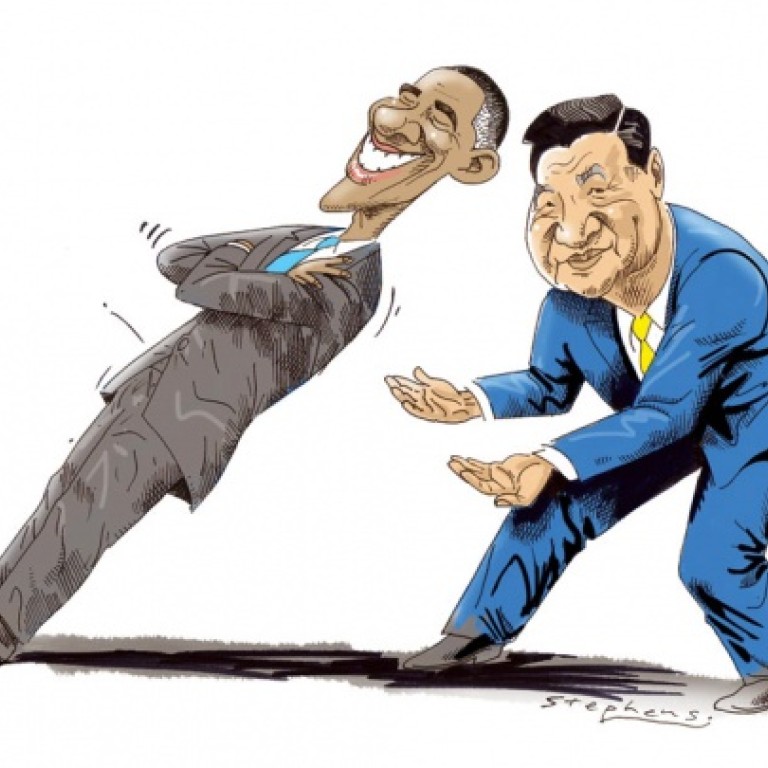
Xi-Obama Sunnylands summit can foster renewed trust
Yun Tang says though fraught with problems, the important relationship between China and America may well flourish in the hands of two leaders who understand the stakes
The first encounter between President Xi Jinping and Barack Obama since the latter's re-election as US president and Xi's elevation to power comes months earlier than had been expected. The informal summit, free from all the formality of protocol at the Californian resort of Sunnylands, will have a far-reaching impact because, in Xi's words, "the current China-US relationship is at a critical juncture".
China's steady rise is posing unprecedented challenges to bilateral ties. Last December, an American intelligence report said China would surpass the US as the world's largest economy by 2030. Recently, the Organisation for Economic Co-operation and Development even predicted it would occur by 2016.
The format itself reveals that the two presidents clearly see a bright outlook for future relations
China's arrival doesn't mean the US will bow out, at least not for the next 100 years or so. But Beijing's expanding global clout has brought forth conflicts of interest with Washington. Consequently, despite deepening interdependence, suspicion has also been growing, as can be seen by the fact that the hawks on both sides now rant much louder to an applauding audience. The next decade will be a risky period for US-China relations.
At this critical moment, a perplexing question will be hanging over the Sunnylands summit: will the US accept a rising China, or, put another way, will China rise in a way that is acceptable to the US? The answer lies in how deeply the two can trust each other.
The top priority of the summit must therefore be to eliminate or defuse the spreading mistrust, and ensure that bilateral relations don't get caught in a downward spiral. Obama and Xi have to reduce the discord, and guide the two nations to overcome their differences, thus ensuring the continuation of peaceful co-operation.
In fact, since Xi first met Obama in Washington in February last year, China and the US have been in close consultation on an array of issues, with the North Korean crisis at the fore. With Xi in office, Beijing and Washington have worked together in the face of the most blatant threats by Pyongyang since the end of the Korean war.
The successful first round of co-operation laid the groundwork for the summit and for even closer ties between the two countries. At Sunnylands, the two leaders will call for denuclearisation of the Korean peninsula, while trying to stop Pyongyang carrying out a fourth nuclear test.
A topic of pressing urgency is cyber-security. The US has been accusing China, especially its military, of cyberspying and cybertheft of its intellectual property, which Beijing has vehemently denied. Now Washington and Beijing have decided to tackle this thorny issue by holding regular, high-level meetings beginning next month, aimed at setting standards for behaviour on cybersecurity. The issue has become entwined with other vital areas and is deserving of attention from the top leaders to seek a satisfactory solution.
Nothing reveals a country's true heart better than its military posture. For Obama and Xi, the toughest item on their agenda is probably military relations and the situation in the East and South China seas. In China's mind, its increased naval presence in the area is a way to enforce legitimate territorial rights which have been sacrificed for too long. But from an American perspective, Chinese activities are intimidating its allies and friends in the region, challenging the credibility of US alliance commitments.
While US-China military communications have been eminently robust this year, both sides are maintaining a heightened vigilance on one another. Last weekend, US Defence Secretary Chuck Hagel reaffirmed in Singapore that Washington will devote more military power to the Asia-Pacific region with a strategic rebalance, or pivot, which Beijing sees as a US effort at containment.
Meanwhile, the Chinese navy has started operating within America's exclusive economic zone, "reciprocating" the US navy's activities off China's coast. Obama and Xi will have to figure out clear ways in which the two militaries can deepen trust, prevent any misjudgments and avoid long-term strategic rivalry.
The Sunnylands talks are also likely to touch on economic concerns. Along with old trade disputes, each side now wants the other to open its domestic markets, with the Chinese complaining of US protectionist measures, some of which fall under the banner of safeguarding national security.
A two-day tête-à-tête may not yield solutions to problems across the board. But the format itself reveals that the two presidents clearly see a bright outlook for relations, and are confident of dealing with any thorny disputes down the road.
They will undoubtedly discuss how to advance the bilateral "co-operative partnership" initiated by Obama and then president Hu Jintao in 2011 while outlining a strategy to invigorate relations.
In a globalised world, co-operation has to be more beneficial than confrontation for the world's two largest economies. Thus, people all over the world can expect the messages from Sunnylands to be promising and sunny.

